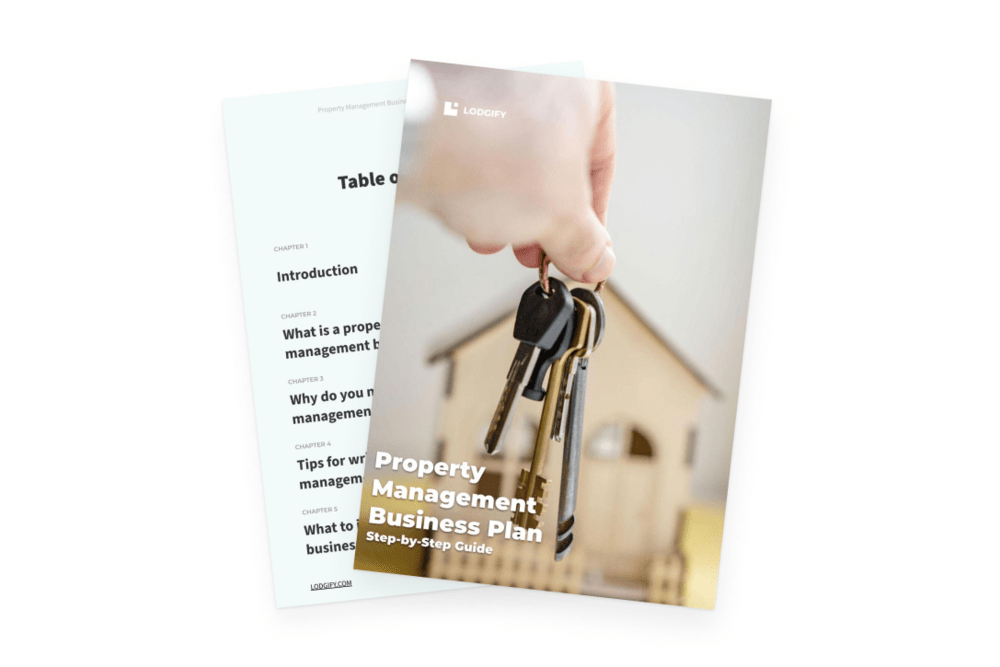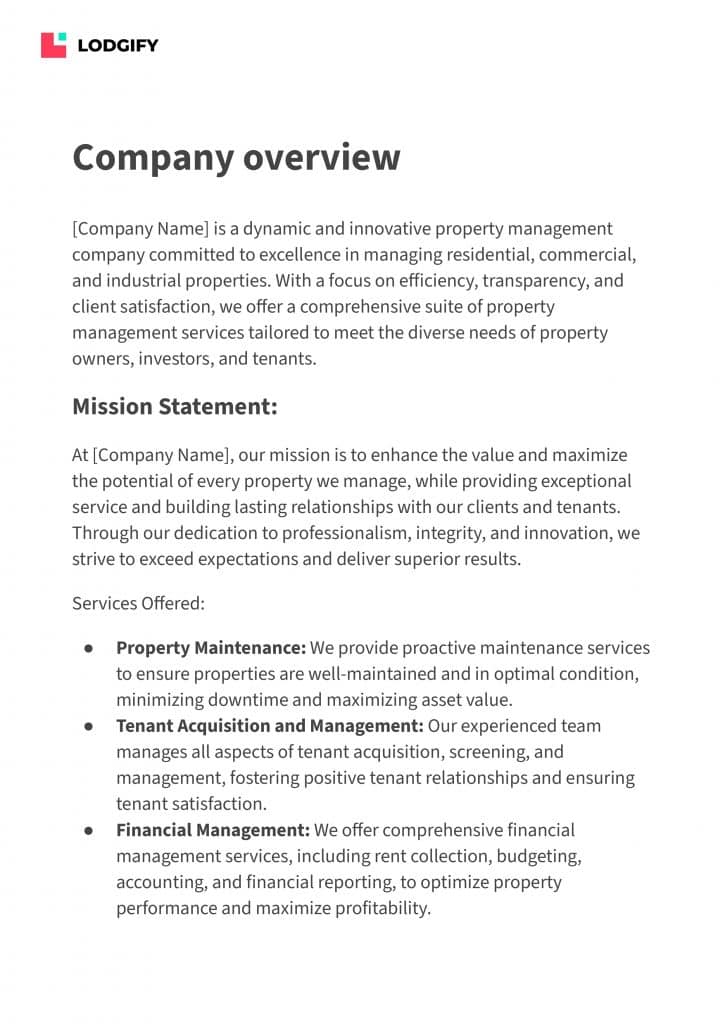If you’re looking to start a property management business, you’ve come to the right place. The success of property management companies—or any companies, for that matter—absolutely depends on first creating a well-researched and thorough business plan.
Luckily, this guide aims to help you do just that. First, we’ll explain what a property management business plan encompasses, why you need one, and tips for going about it the right way. Then, we’ll walk you through the recommended business plan outline step-by-step and share details of what to include in each section.
Finally, we’ll send you off with a free template you can download and update with your business’s own information. Creating a business plan was never so easy!
Let’s dive in.
Don’t see the form to download our free property management business plan template? Click here.
What is a property management business plan?
A property management business plan is a document that summarizes your property management business: its current operations, goals for the future, strategies for achieving those goals, and other supporting details.
While you’ll want to create your business plan before launching your businesses, it’s not a one-and-done document. Instead, you should update it yearly and after major company and industry changes.
Why do you need a property management company business plan?
Whether you’re looking to start a new property management company or grow your existing one, you’re probably eager to get started. But while it can feel productive to hit the ground running, a business plan is crucial to drive your strategy and decision-making. It will serve as a roadmap you can refer back to as you get started and grow your business.
Moreover, business plans are also crucial as tools to help sell your property management agency to potential partners, investors, and banks. There’s no point in asking for their support if you can’t show you know what you’re doing, and business plans are one of the best ways to do that.
Finally, beyond mere financial gains, a thorough property management business plan enables you to measure your success accurately and pinpoint areas for improvement. It empowers you to zero in on critical indicators like your budget, local market insights, and expansion opportunities.

How do you write a property management business plan?
Do your research first
It’s easy to spot the differences between a well-researched business plan and one that was written haphazardly. And those differences will be just as easy to mark in the results your business sees once it’s up and running.
Tailor it to your type of property management business
Chances are, you’re going to start your business plan from a standard template. There’s nothing wrong with that. In fact, it’s recommended, and we provide a free property management business plan template at the end of this article, if you’re still looking for one.
However, as you fill in your information, be sure to tailor your plan to your specific business. For example, what type of properties does your business manage? Common types of property management include:
- Residential rental property management, including both single-family and multifamily residences
- HOA property management, which typically involves working directly with homeowners’ associations
- Commercial property management, including office, retail, and industrial buildings
- Vacation rental property management, involving managing vacation rentals such as Airbnbs for their owners
Remember your goals
You might wonder whether you really need to include this much detail in your business plan, but remember what you’re hoping to achieve. And we don’t just mean a successful property management agency, but the specific things you’ll use your business plan for.
For example, if you’re hoping to find a partner for your business, your prospects will certainly appreciate a high level of detail in your operations plan. Similarly, potential investors will want to see solid financials.
Use a property management business plan template
Finally, don’t make it harder for yourself than you have to! You’re already going to have to do a significant amount of research, calculations, and brainstorming. Make it easier for yourself by starting with a template you can input specifics to, like the one pictured below:

Don’t have a template already? Scroll to the bottom of the article to download ours!
What is the outline of a property management plan?
Business plans, whether for property management or other industries, tend to follow this standard format:
- Executive summary
- Company overview
- Market analysis
- Marketing plan
- Operations plan
- Management team
- Financial plan
- Growth opportunities
- Appendix
Keep reading for more information on what to include in each section. Or scroll to the bottom of the page to download our business plan template for property management and get started.
What to include in a business plan for property management
Executive summary
Your business plan should begin with an executive summary. This section serves as an introduction to both your business plan and your business, and should include information such as:
- The type of property management you plan to do
- How far along your business is
- Your target market
- Your goals
- Your strategy for achieving these goals
Depending on how thorough you want to be, you could even include a brief overview of every section of your business plan. Your goal should be to give a snapshot of your business that compels your readers—whether they be potential partners, investors, or banks—to finish reading your plan.
Pro tip: Because your executive summary needs to sum up your overall business plan, it’s often easiest to write it last. That way, you’ll have all the details ironed out and won’t forget to include anything.
Company overview
In this section, you’ll give an overview and analysis of your property management company itself.
To start, explain how your company got started and which of the property management niches we explained above you fit into. You’ll also want to share your legal business structure (for example, sole proprietorship, LLC, C corporation, or S corporation).
The majority of this section, however, should be devoted to your competitive differentiators. What core competencies are you bringing to the market?

Market analysis
A market analysis isn’t only an important addition to your business plan. It’s also absolutely essential that you understand your market inside and out before you even consider launching a property management agency.
To be as thorough as possible, make sure that your market analysis includes specific analyses of your industry, target customers, and competitors.
Industry analysis
Provide an overview of your specific niche of the property management industry. Include as much detail as you can to help you become an expert in your industry, such as:
- Market size (in dollars)
- History of the industry
- Prospected growth
- Trends
Customer analysis
Who are your target customers? Start with your property management niche, and then get even more specific:
- Residential rental property management → Will you target single-family or multifamily residences? Apartment buildings or individual homes? Affordable housing or high-end residences?
- HOA property management → Do you have specific HOAs in mind?
- Commercial property management → Will you manage office, retail, or industrial buildings?
- Vacation rental property management → Do you want to work with a specific type of vacation rental property or owner?
Be sure to include your target customers’ specific needs, goals, and any other information you can find to build a robust profile. The more detailed you can be, the easier it will be to target them with your services!
Competitive analysis
This is where you analyze your competitors, both direct and indirect:
- Your direct competitors include other property management companies in the same niche as you. These companies will likely be located nearby as well.
- Your indirect competitors include other options your customers have outside of property management agencies. This might include property owners who decide to manage their properties themselves, in-house managers, and even automated tools that claim to take the place of property managers.
After identifying the competition, you’ll want to provide additional information about your direct competitors. Who are their target customers? What services do they offer, and how much do they charge?

Gather as much information as you can, and then perform a SWOT (strengths, weakness, opportunities, and threats) analysis to identify potential competitive advantages. Your goal is to determine how you’ll outperform your competitors—whether via superior or additional services, lower prices, greater efficiency, or something else.
Remember: If you can’t identify any clear competitive advantages, your customers won’t be able to, either.
Marketing plan
So, you have superior property management services at competitive rates. But how do you plan on getting in front of your target customers?
This is where your marketing plan comes in. Think about what marketing channels you’ll use, prioritizing those which will best reach your target customers. Consider both online and offline marketing, including the following options:
- Offline marketing:
- Business cards
- Flyers
- Radio
- Advertising in local newspapers and relevant magazines
- Online marketing:
- Website
- SEO marketing
- Email marketing
- Social media marketing
- Paid advertising
Operations plan
Creating your business plan has forced you to set some specific goals. How do you plan on meeting them?
This is exactly what your operations plan sets out to cover, with details on both short- and long-term processes.

Your short-term processes will include everything involved in the day-to-day running of your property management business. Again, these tasks will vary drastically depending on your property management niche. However, the following questions are a good starting point:
- Who will be in charge of running the business?
- Do you need to hire any additional staff? If so, how many people and for which roles?
- How will you structure your team?
- What are your service standards?
- Which manuals will you need to develop?
- What property management software will you use?
Once you’ve defined your daily operations, take a step back and think long-term. At any point in your business’s trajectory, do you plan to:
- Hire additional employees?
- Reach a certain sales figure?
- Grow your portfolio?
- Expand to a new location?
Having these long-term goals documented will not only show potential partners and investors that you’re thinking about the future. It will also give you something to refer back to in order to measure your progress.
Management team
Your property management business will only be as strong as the team leading it. So, once you’ve assembled the dream team, you’ll want to highlight its strengths in your business plan, paying specific attention to each member’s background, skills, and relevant experience.
If no one on your management team has property management or real estate experience, or your team is lacking in any way, it might be worthwhile to put together an advisory board. This board consists of a handful of mentors who have the experience necessary to guide your business in the right direction (and reassure any potential investors).
Financial plan
And now for everyone’s favorite part: the financial plan.
Specifically, your financial plan should consist of a five-year financial statement. The first year of your financial statement should include monthly and quarterly projections, with the remaining years including annual figures.

What goes in a financial statement? Let’s break it down:
- Profit and loss statement: Also referred to as an income statement, a profit and loss statement subtracts your costs from your revenue to find your profit. As you can imagine, you’re going to be making a lot of calculated assumptions at this point. Try to be as accurate as possible when predicting your costs and revenue. Otherwise, your profit and loss statement won’t paint a very accurate picture.
- Balance sheet: A balance sheet details your business’s assets (what you own) and liabilities (what you owe) in order to provide a snapshot of its finances. Your assets might include office space or software solutions, whereas liabilities would include any loans you’ve taken out to start your business.
- Cash flow statement: A cash flow statement shows how changes in your income and balance sheet affect your cash flow—and your ability to operate in the short- and long-term. Its goal is to show how much money you need to run your business so that you don’t run out of cash.
Growth opportunities
If you’re just getting started, it may feel too soon to consider growth opportunities. But thinking about your business’s long-term goals and plans is essential to set yourself up for success. After all, you don’t only want to succeed now. You want to make sure you have what’s necessary to succeed for years to come.
On that note, analyze the property management and real estate market in your area to identify growth opportunities for your business over the next five to 10 years, such as:
- Upgrades to your tech stack
- Strategic partnerships
- Expansion plans
- Opportunities to take advantage of new market trends
Appendix
If you have any supporting documentation that could strengthen your business plan, such as buyer personas for your target customers or more complete financial projections, feel free to attach them in the appendix. That way, the additional information is there for anyone who wants to see it, but it doesn’t clutter up your business plan.
Property management business plan example
Curious about what a business plan for property management looks like? We’re including a property management business plan sample (the company overview, specifically) below to give you an idea:

Want a customizable version? Scroll to the bottom of the article to download our free template!
Download our free property management business plan template
Ready to get started? We’re here to help!
Download our free template below and simply fill in your own information. Our straightforward guide includes all the details you need to cover before starting your new business.
Don’t see the form to download our free property management business plan template? Click here.

